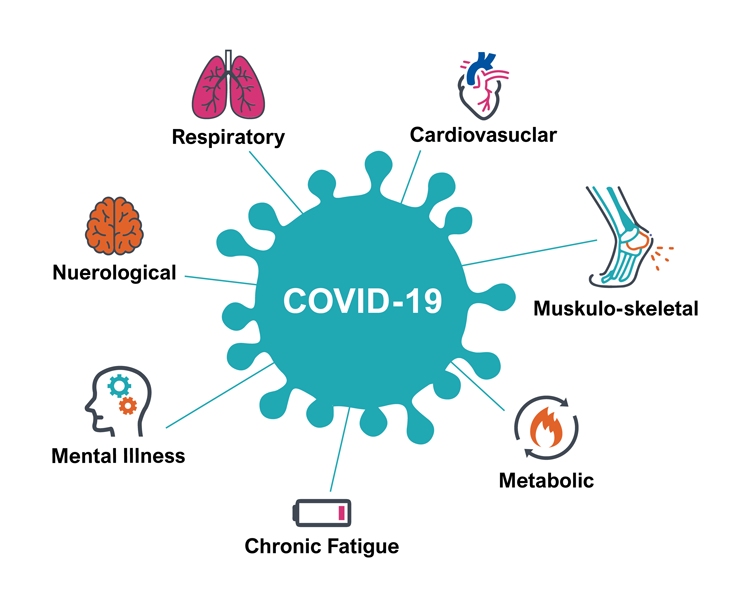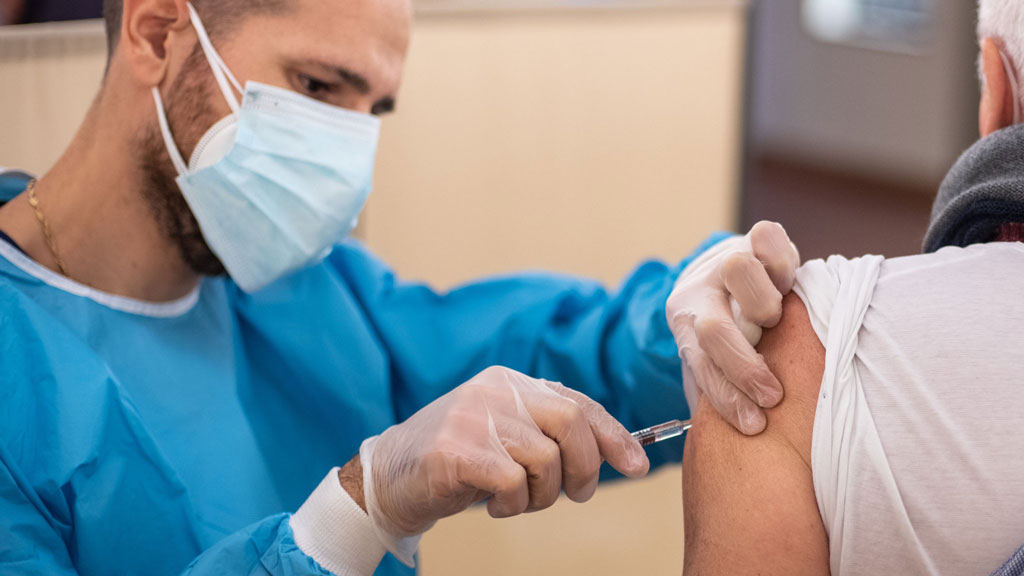Long COVID
What is Long COVID?
COVID-19 has impacted the whole world in many aspects. Most people infected with COVID-19 recover completely within a few weeks. Some people might experience symptoms even after recovery causing long COVID or post COVID-19 syndrome. These people refer to themselves as "long haulers".
Some people, even with mild versions of the disease continue to experience symptoms after their initial recovery. The effects of COVID-19 might persist for more than four weeks or months after you've been diagnosed with the COVID-19 virus. The virus causes damage to various organs such as the lungs, heart, and brain, which increases the risk of long-term health problems.

Nearly 80% of people with COVID-19 end up having a mild reaction and most of those cases resolve in about two weeks. However, for people having a severe response to the virus, it can take between three and six weeks to recover. There is a separate group of people who do not fall into these groups and they are of growing concern.
About 10% of people who’ve had COVID-19 might experience prolonged symptoms for weeks to months after they were infected. There is no specific reason for long COVID. The long-haulers have mixed symptoms both mild and severe cases. It can affect anyone be it young, old, healthy, one who had a chronic condition, those who were hospitalized, and those who weren’t.
What causes Long COVID?
COVID-19 primarily affects the lungs, it can damage many other organs as well. The multiple organ damage may increase the risk of long-term health problems leading to long COVID.
1. Affect to organs: Affected organs include:
Heart: Doctors have observed damage to the heart muscle, even in people who experienced only mild COVID-19 symptoms. COVID-19 increases the risk of heart failure or other heart complications in long COVID.
Lungs: Pneumonia associated with COVID-19 can cause long-term damage to the tiny air sacs or alveoli in the lungs. The scar in the tissue resulting from long COVID can lead to breathing problems.
Brain: COVID-19 can cause strokes, seizures, and Guillain-Barre syndrome even in young people. This might even lead to temporary paralysis. COVID-19 in long-haulers also increases the risk of developing Parkinson's disease and Alzheimer's disease.
Some adults and children suffering from long-COVID experience multisystem inflammatory syndrome. This might cause some organs and tissues to become severely inflamed.
2. Blood Vessel problems and blood clots: Long COVID can make blood cells more likely to clump up and form clots. The large clots cause heart attacks and strokes. Major heart damage caused by COVID-19 is from very small clots that block tiny blood vessels or capillaries in the heart muscle. The blood clots affect other organs of the body such as lungs, legs, liver, and kidney as the long COVID would weaken the blood vessels. The weakened blood vessels can leak contributing to long-term damage to the liver and kidney.
Mood and Fatigue problems: COVID-19 has an emotional toll on people, especially those who are hospitalized due to intensive care unit, with mechanical assistance such as ventilators to breathe. Surviving this causes more likely to later develop post-traumatic stress syndrome, depression, and anxiety.
COVID-19 is surprising researchers and medical professionals each day. Much about COVID-19 and long COVID is still unknown. COVID-19 will affect people over time, but research is ongoing. Even after recovery from COVID-19, it is important to follow precautions to avoid long COVID infection. Precautions would require wearing masks, social distancing, avoiding crowds, getting a vaccine when available, and keeping hands clean.

What are the Symptoms of Long COVID?
Long COVID affects each person in different ways. You might experience a wide range of symptoms that could linger for a long time.
Elderly people and people with various serious medical conditions are the most likely to experience lingering COVID-19 symptoms. But, even young or healthy people can feel unwell for weeks to months after infection. Common signs and symptoms that remain over time include:
Fatigue or extreme tiredness.
Shortness of breath or difficulty breathing.
Cough or sore throat.
Joint pain.
Chest pain or tightness.
Memory, concentration, or sleep problems.
Muscle pain or headache.
Fast or pounding heartbeat.
Heart palpitations.
Loss of smell or taste.
Depression or anxiety.
Tinnitus or earaches.
Fever.
Dizziness when you stand.
Worsened symptoms after physical or mental activities.
Brain Fog.
In rare scenario, long COVID affect your organs including:
Inflammation of your heart muscle.
Lung-related issues.
Kidney problems.
Hair loss.
Skin rashes.
Difficulty with concentration and memory.
What is the importance of Vaccines in Long COVID?
Researchers have found that fully vaccinated people had 50% less chance of developing COVID-19 symptoms. The long COVID symptoms may subside almost 28 days after infection. It is advised to take both doses of COVID-19 vaccines like those made by Pfizer/BioNTech, Moderna, and Oxford/AstraZeneca.
People who are fully vaccinated with both doses of Covid-19 appear to have a much lower possibility of developing long COVID in comparison to unvaccinated people even when they contract the coronavirus.

How to treat and support Long COVID?
Many people diagnosed with long-term COVID experience symptoms affecting the brain, nervous system, heart, and lungs. The COVID treatment team would include specialists in neurology, cardiology, and pulmonology.
Long COVID symptoms can branch from issues in several body systems at once, requiring care and treatment from multiple specialists. Long COVID treatment regime includes multi-specialty guidance including:
Internal medicine
Cardiology
Neurology
Psychology
Pulmonology
The specialist focus on treating the symptoms for fast recovery including:
Counseling and Support: Psychologists would treat depression, anxiety, and other mental health concerns resulting from the long-COVID syndrome.
Diabetes Care: Diabetes might worsen the symptoms of COVID especially in long-haulers. Doctors would focus on controlling diabetes with medication and diet.
Medications: Doctors would prescribe medication based on the symptom and underlying medical condition.
Physical Therapy: People with long COVID experience joint pain, muscle pain, and problems with lung and heart function. This can lead to long-term effects on mobility with long COVID people.
Pulmonary rehabilitation: Long haulers suffer mainly from pulmonary issues. Doctors recommend various advanced techniques to restore lung function and strengthen the muscles that help you breathe. The treatment regime may include a combination of customized respiratory therapy, breathing exercises, and medications.
Takeaway
Long COVID is also referred to as post-acute squeal of SARS-CoV-2 infection or PASC. It has been mysterious and frustrating features of the pandemic to the researchers. It’s defined as the persistent pattern of symptoms including fatigue, forgetfulness, and body aches for an extended period. People affected with long COVID can become “long haulers” even after mild initial infections. Vaccination is the best way to fight long COVID infection.
If you or anyone you know is suffering from the long-term effects of Covid, our expert providers at Post Covid Centers will take care of your health and help you recover.
Call us on (469) 545-9983 to book a telehealth appointment for a home check-up.
Post Covid Syndrome vs. Fatigue
While COVID-19 is a short-lived disease in most people, others experien...
Post Covid Syndrome vs. Skin Weakness Problems
A new study illustrates that some patients with COVID-19 disease have continuous skin-associated symptoms...
RELATED BLOGS
